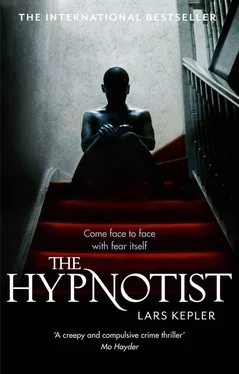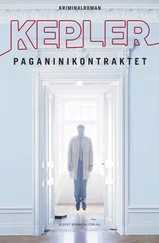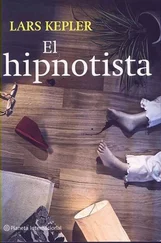“I suggest you go out and buy a paper. Then I think you ought to sit down and think about your response. The board would like to see you at four o’clock this afternoon.”
When I saw my face on the front page, I felt as if my heartbeat were slowing down. It was a close-up of me in my woolly hat and black top. My face was flushed, I looked bilious and irritable, and I seemed to be waving my hand dismissively. I bought a copy of the paper and went back home. The centre spread was adorned with a picture of Lydia, curled up with a teddy bear in her arms. The whole article focused on how I, Erik Maria Bark, had used her as a kind of lab rat, persecuting her with assertions of abuse. I had broken her down, taking advantage of her suggestibility during deep hypnosis to manipulate her into believing herself guilty of imaginary crimes. The culmination of my persecution had come when I stormed into her house and challenged her to commit suicide. She had simply wanted to die, she said. She compared herself to a member of a cult and me to a cult leader and asserted that, thanks to me, she had no will of her own. It was only when she was in the hospital that she finally dared to start questioning my treatment of her. According to the reporter, she had wept and explained that she wasn’t interested in any kind of compensation. Money could never make up for what she had been through. All she wanted was that I never be allowed to do this to anyone else.
On the next page was a picture of Marek. The ex-torturer agreed with Lydia, saying that my activities were life-threatening, and that I was obsessed with making up sick ideas to which my patients were then forced to confess under hypnosis.
Farther down the page, a so-called “expert” furnished a comment- I’d never heard of the man- but here he was denigrating the whole of my research, equating hypnosis with a séance and hinting that I probably drugged my patients in order to get them to do what I wanted.
There was an empty silence inside my head. I sat at the kitchen table until the door opened and Simone walked in. When she had read the paper, her face was ashen.
“What’s happening?” she whispered.
“I don’t know,” I said. My mouth was completely dry.
I sat there staring into empty space, thinking the unthinkable. What if my theories were wrong? What if hypnosis didn’t work on deeply traumatized individuals? What if it was true that my desire to find patterns had influenced their memories? I didn’t believe it was possible for Lydia to see a child that didn’t exist while she was under hypnosis. I had been convinced that she was describing a genuine memory, but now I was beginning to doubt myself.
It was a strange experience, walking the short distance through the lobby to the lift up to Annika Lorentzon’s office. For years, the place had been like a second home to me, but now none of the staff wanted to look me in the eye. When I passed people I knew and associated with, they simply looked stressed and strained, turned away, and hurried off.
Even the smell in the lift was strange. It smelled of rotten flowers, and it made me think of rain, farewells, funerals.
As I walked out of the lift, Maja Swartling slipped quickly past, ignoring me. Rainer Milch was waiting for me in the doorway of Annika’s office. He moved aside and I went in and said hello.
“Please sit down, Erik,” said Rainer.
“Thank you, I’d prefer to stand,” I said curtly, but regretted it at once. What the hell had Maja Swartling been doing in here? Perhaps she had come to my defence. After all, she was one of the few people who had a real, detailed knowledge of my research.
Annika Lorentzon was standing by the window on the far side of the room. I thought it was both odd and impolite of her not to welcome me. Instead she stood there with her arms wrapped around her body, staring fixedly out the window.
“We gave you a real opportunity, Erik,” said Peter Mälarstedt.
Rainer Milch nodded.
“But you refused to back down,” he said. “You refused to step aside voluntarily while we conducted our investigation.”
“I could reconsider,” I said quietly.
“It’s too late now. We could have used it to defend ourselves the day before yesterday; today it would just look pathetic.”
Annika opened her mouth. “I’m going to appear on TV tonight to explain how we could have allowed you to continue,” she said faintly, without turning to face me.
“But I haven’t done anything wrong,” I said. “The fact that a patient comes along with ridiculous accusations surely can’t be allowed to negate years of research, countless treatments that have always been beyond reproach- ”
“It isn’t just one patient.” Rainer Milch interrupted me. “It’s several. In addition, we have a contact who has been studying your work for several years. In her opinion, you have overreached, and almost all your theses are built on castles in the air. You have no proof, and you constantly disregard the best interests of the patients in order to ensure that you are right.”
I was completely at a loss. “And the name of this expert?” I asked.
They didn’t respond.
“Is her name perhaps Maja Swartling?”
Annika Lorentzon’s cheeks flushed red. “Erik,” she said, turning to face me at last. “You are suspended from today onwards. I don’t want you in my hospital any longer.”
“But what about my patients? I have to see- ”
She cut in. “They will be transferred.”
“That won’t do them any good, they- ”
“Well, whose fault is that?” she said, raising her voice.
There was total silence in the room. Frank Paulsson stood with his face averted; Ronny Johansson, Peter Mälarstedt, Rainer Milch, and Svein Holstein remained seated, their faces expressionless.
“So that’s it, then,” I said emptily.
Just a few weeks before I had stood in this same room and been allocated new funding. Now it was all over.
When I reached the lobby, a group of people were waiting for me. A very tall woman with blonde hair thrust a microphone in front of my face.
“Hi,” she said brightly. “Do you still believe that hypnosis is a good form of treatment?” she asked.
“Yes.”
“So you’re going to continue practising?”
I turned away, but the television cameraman followed me, the black gleam of the lens seeking me out. I looked at the blonde woman, read the name badge on her chest, stefanie von sydow, saw her white crocheted hat and her hand, waving the camera over.
“I wonder if you’d like to comment on the fact that another of your patients, a woman named Eva Blau, was committed last week to a secure psychiatric unit.”
“What are you talking about?”
The white light streaming through the tall hospital windows at the end of the corridor was reflected in the recently mopped floor of the secure psychiatric unit at Southern Hospital. I passed a long row of locked doors with flaking paint and rubber strips around their edges and stopped outside B39. Looking back down the corridor, I noticed that my shoes had left tracks in the shining film covering the floor.
From a distant room, loud thuds could be heard, then the faint sound of weeping, and then silence. I stood for a while trying to gather my thoughts before I knocked on the door, turned the key in the lock, and went in.
The waft of disinfectant I brought in with me blended with the miasma of sweat and vomit in the dark room and almost made me retch. Eva Blau was lying on the bed with her back to me. I went over to the window to pull up the roller blind and let in some light, but the mechanism was stuck. Out of the corner of my eye I could see Eva starting to turn over. I tugged at the blind but lost my grip and it flew up with a loud crack.
Читать дальше
Конец ознакомительного отрывка
Купить книгу












